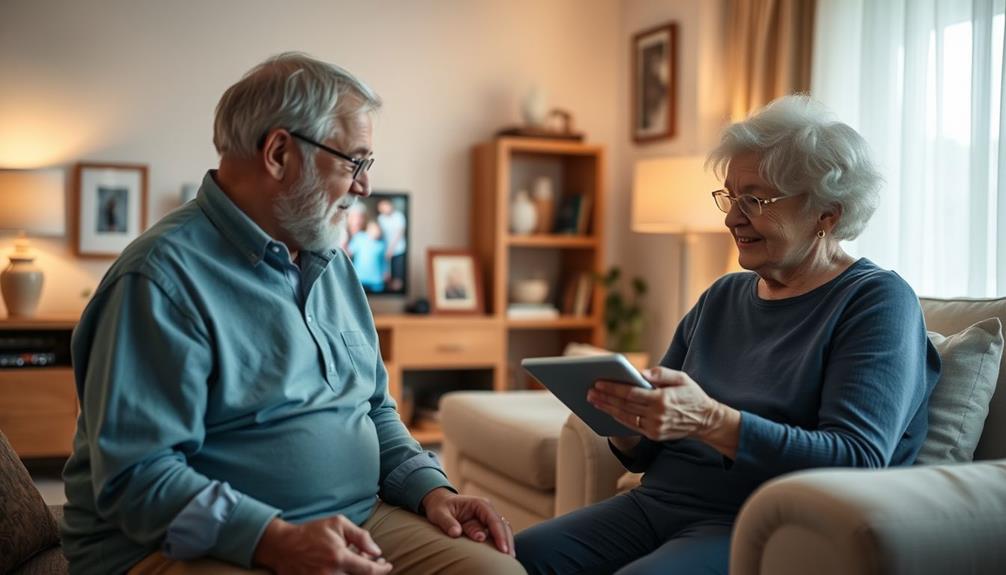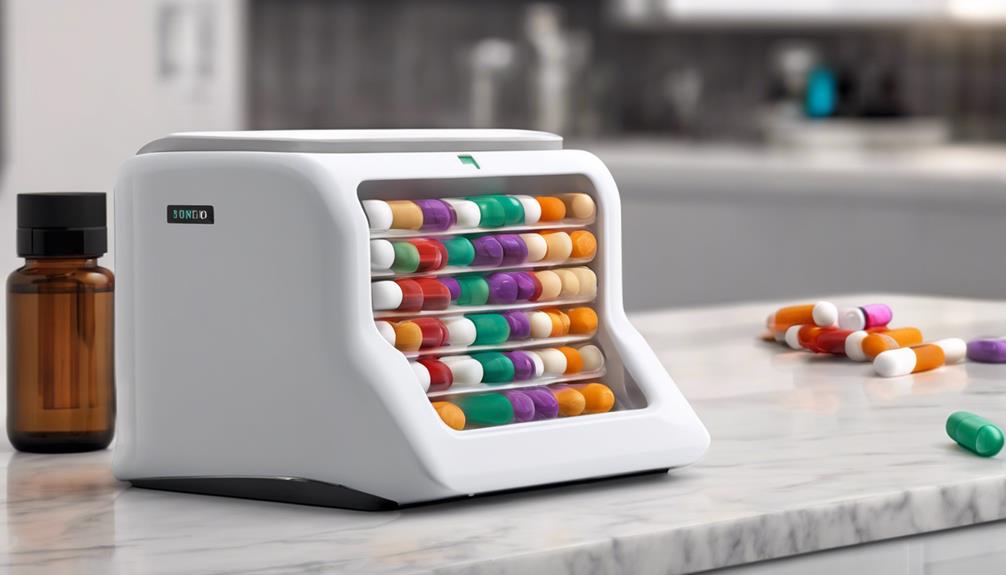Technology and applications are crucial tools for providing support to individuals with dementia and their caregivers. Consider exploring options such as MindMate for cognitive games and daily planners, or Medisafe for medication reminders. Caregivers can benefit from apps like Carely and Lotsa Helping Hands to effectively coordinate care and manage tasks. Tools like SingFit incorporate music therapy to enhance emotional well-being. Additionally, you can discover resources for assistance with daily living and safety improvements. These solutions not only help alleviate daily obstacles but also contribute to strengthening relationships. There is a wealth of opportunities available for improving care and support for your loved ones.
Key Takeaways
- Apps like MindMate and Lumosity offer brain training games to enhance cognitive health and memory for dementia patients.
- Medisafe provides personalized medication reminders and refill tracking to ensure timely medication adherence.
- Caregiver support tools like Carely and Lotsa Helping Hands streamline communication and coordination of care activities.
- Therapeutic resources, including music therapy and essential oils, promote emotional well-being and reduce anxiety for dementia patients.
- Future trends in dementia care technology include AI integration and virtual reality experiences to enhance personalized care and therapeutic interventions.
Overview of Key Apps
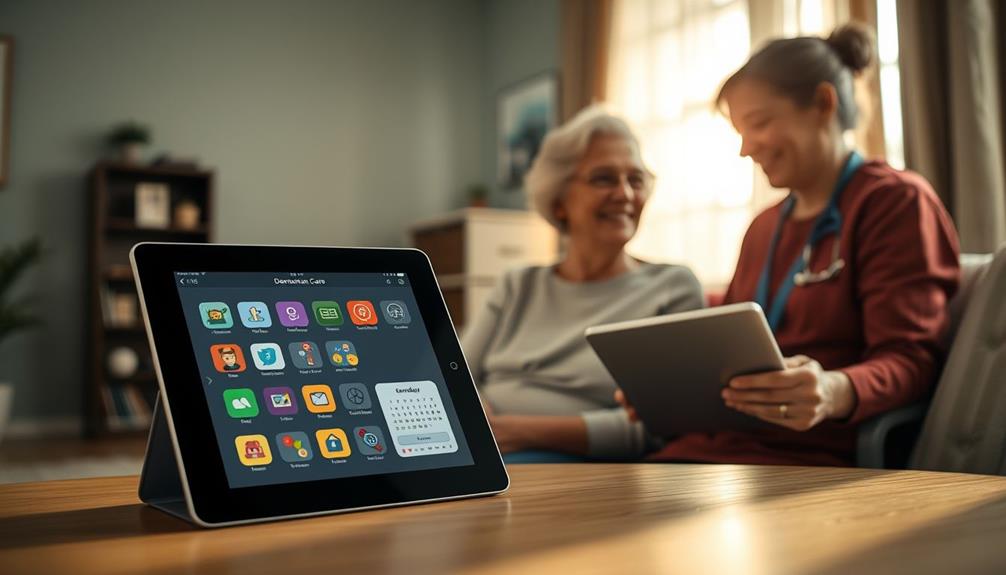
When it comes to supporting dementia patients, several key apps can make a significant difference in their daily lives. For caregivers, using apps like MindMate can streamline daily tasks to help your loved ones manage their symptoms. This all-in-one resource offers brain training games, workout plans, and health tracking by connecting to Apple HealthKit. In addition to MindMate, caregivers may also consider devices like the Jitterbug Smart3, which is designed with ease of use in mind. When evaluating the jitterbug smart3 pros and cons, it’s important to note that while the large screen and simple interface cater to seniors, some users may find the phone’s features somewhat limited compared to more advanced smartphones. However, for dementia patients, the simplicity and enhanced accessibility can often outweigh these concerns, providing peace of mind for both patients and caregivers alike.
Additionally, caregivers should be aware of the importance of selecting the right cold medication for those who may also be dealing with seasonal illnesses, ensuring thorough support in their care.
Lumosity is another effective brain training app, providing over 40 interactive challenges aimed at enhancing cognitive health. This can be particularly beneficial for those experiencing memory loss, helping to strengthen memory and problem-solving skills.
For medication management, Medisafe is invaluable. It sends personalized reminders, tracks refills, and warns about drug interactions, ensuring that patients adhere to their prescriptions.
Lastly, consider SingFit, a music therapy app that enhances cognitive health through personalized music and interactive singing exercises, making it a wonderful activity for memory engagement.
Caregiver Support Tools

Supporting dementia patients goes beyond just using apps focused on cognitive health; caregivers also need tools that streamline their responsibilities and enhance communication. Understanding financial considerations for elderly care is also vital for caregivers, as it can ease the burden of care.
Caregiver support is essential for managing the daily challenges you face. Apps like Carely allow for effective care coordination by providing a shared calendar and messaging system, which helps reduce stress and burnout.
Lotsa Helping Hands makes it easy to organize meal deliveries, rides, and visits, guaranteeing that you can focus on what truly matters. Effective communication within care teams fosters social connections and reduces feelings of isolation for both you and those caring for dementia patients.
The Its Done! App lets you create custom task lists, helping dementia patients maintain their routines and independence. This personalized approach to task management guarantees that daily activities are manageable and efficient.
Additionally, resources like the Care Assessment and Guidance tool offer tailored recommendations, making it easier for families to navigate dementia care. By leveraging these caregiving apps, you can enhance your support system, reduce stress, and guarantee a more effective caregiving experience for everyone involved.
Cognitive Enhancement Applications
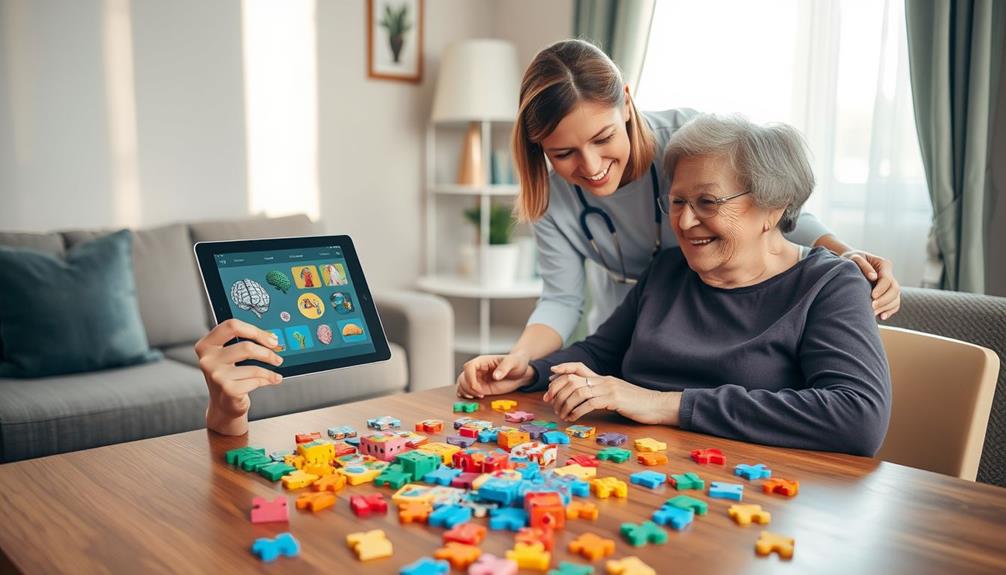
Cognitive enhancement applications play an essential role in supporting dementia patients by providing engaging and interactive ways to maintain mental acuity. These apps offer a variety of activities that stimulate the brain, helping to improve memory and cognitive health.
For instance, the MindMate app features brain-training games alongside daily planners and workout plans, making it easy for you and your loved ones to track health progress through Apple HealthKit. Additionally, the environmental interactions and social factors discussed in developmental psychology can influence cognitive engagement in patients, emphasizing the importance of tailored activities to meet individual needs key domains of development.
Lumosity stands out with over 40 interactive challenges designed to boost memory, logic, and problem-solving skills. It customizes workouts based on user progress, ensuring that dementia patients remain engaged.
Nymbl Training focuses on fall prevention while incorporating brain games that enhance cognitive function, drawing on over 35 years of clinical research.
Constant Therapy offers tailored speech and therapy programs to improve daily living skills, accessible across multiple devices for versatile use.
Medication Management Solutions
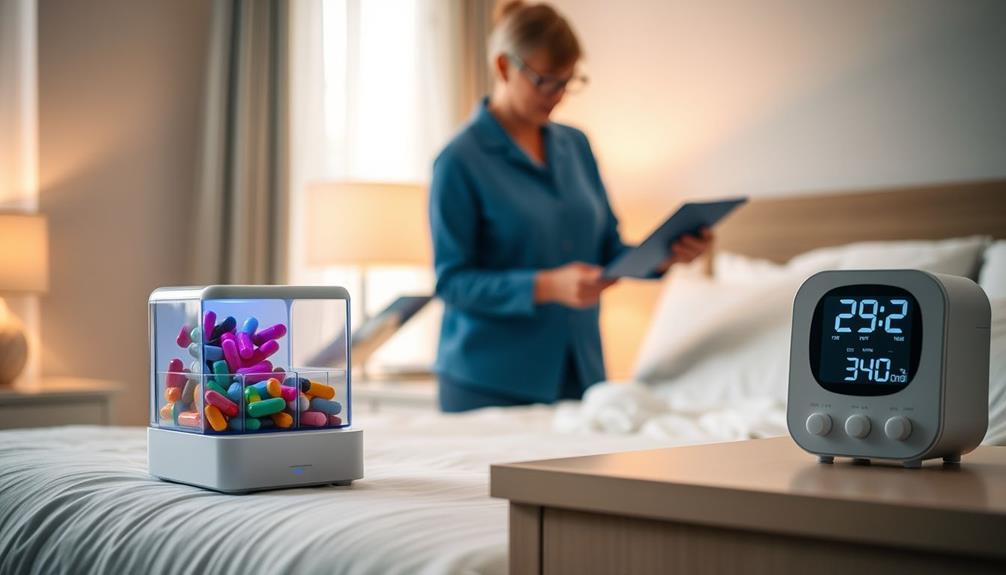
Managing medications can be a challenging task for caregivers of dementia patients, but technology offers effective solutions to simplify this process. Mobile apps like Medisafe provide personalized reminders and customizable alerts that help guarantee patients take their medications on time. These tools are vital for maintaining medication schedules and enhancing adherence to treatment, which is essential for the health and well-being of dementia patients.
Additionally, caregivers can benefit from understanding the importance of budgeting for healthcare costs, as medication management might require financial planning to guarantee necessary resources are available.
With features that track refill dates and alert users to potential drug interactions, caregivers can navigate complex medication management with ease. The convenience of a mobile app allows you to monitor multiple medications simultaneously, reducing stress and minimizing the risk of missed doses.
Moreover, many medication management apps include communication features, enabling caregivers to coordinate effortlessly with pharmacies and healthcare providers. This seamless communication guarantees everyone involved is informed, which can further enhance the quality of care for dementia patients.
Incorporating these technology solutions into your caregiving routine not only supports adherence to treatment but also fosters peace of mind, knowing your loved one is receiving the necessary medication at the right times. Embrace these innovative tools to manage medication effectively and improve overall care.
Daily Living Assistance Tools
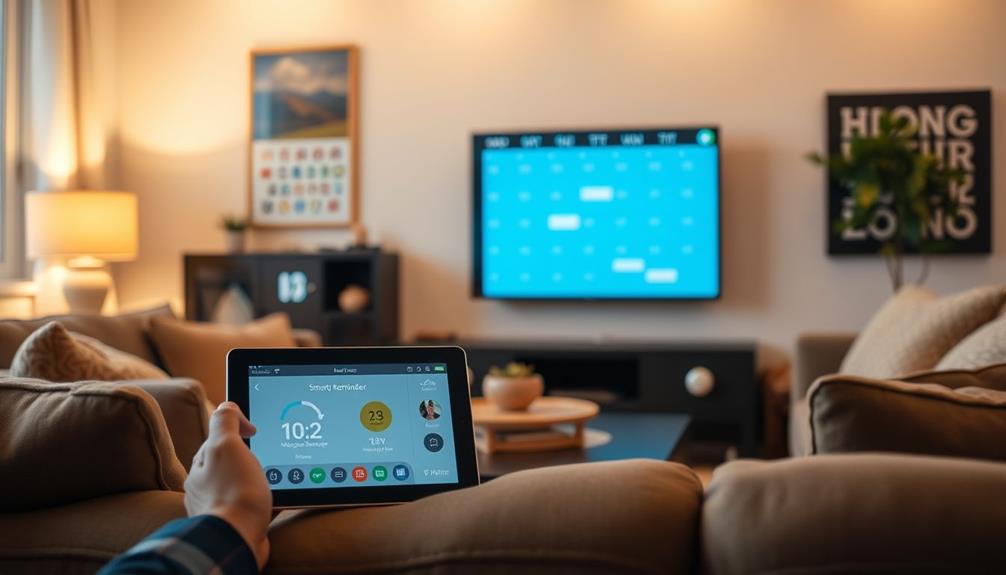
Daily living assistance tools play an essential role in improving the quality of life for dementia patients by promoting independence and routine.
These tools can help both people with dementia and their caregivers manage daily tasks more effectively, ensuring a safer and more comfortable living environment. Incorporating strategies like yoga for back pain can also provide additional support for caregivers dealing with physical strain.
Here are some helpful Apps you might consider:
- Its Done! App: Offers a customizable task list with 40 daily tasks, sending notifications to promote routine.
- Iridis App: Provides practical tips for home organization, focusing on safety and comfort, like better lighting and noise reduction.
- Medisafe App: Manages medication by sending reminders and tracking refills, ensuring adherence to prescribed treatments.
- Carely App: Facilitates caregiver duties via a shared calendar for tracking activities and appointments, reducing caregiver stress.
Emotional and Therapeutic Resources
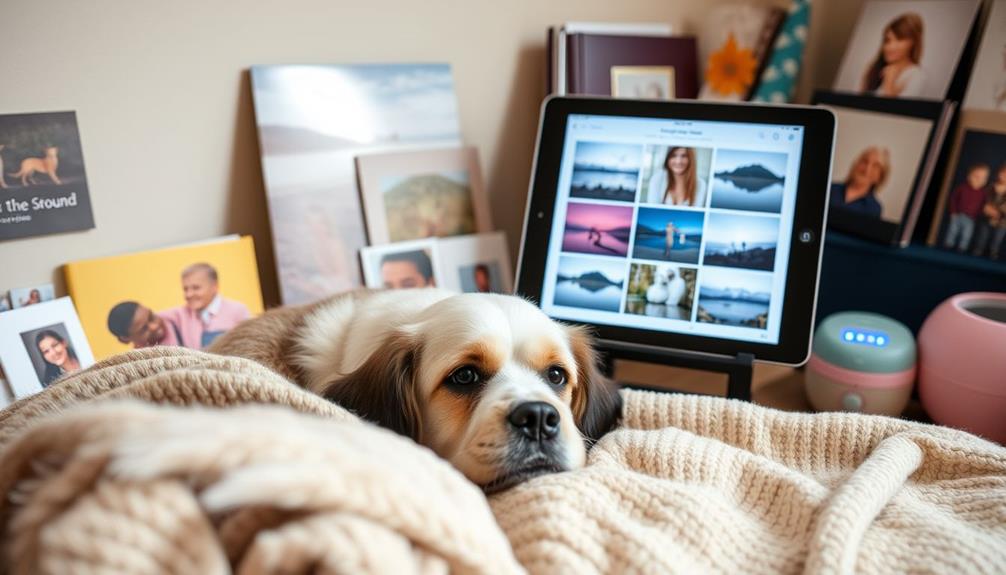
While daily living assistance tools help maintain routines and independence, emotional and therapeutic resources add another layer of support for dementia patients.
Utilizing therapeutic music apps like SingFit can greatly enhance mood and memory through interactive singing exercises and personalized playlists. For just $4.99 a month, you can access music therapy that fosters emotional well-being and improves cognitive function.
Additionally, incorporating essential oils for calming into the environment can create a soothing atmosphere, further enhancing the therapeutic experience.
Engaging sensory devices, including digital photo frames, serve as valuable tools for enhancing emotional connections. By displaying notable photographs, they can spark communication between patients and caregivers, enriching interactions and deepening relationships.
Incorporating these therapeutic resources into care plans is essential, as research shows they can reduce anxiety and agitation.
Frequently Asked Questions
What Technology Helps With Dementia Patients?
When supporting someone with dementia, consider tools that enhance memory, provide reminders, and improve safety. Technologies like wearable devices, smart home systems, and engaging activities can greatly improve their daily experiences and overall well-being.
What Apps Are Good for People With Dementia?
Imagine tackling every daily challenge like a superhero! You'll love MindMate for brain games, Carely for caregiving harmony, and SingFit for musical magic—each app's designed to make life easier and more engaging for you!
What Is the New App for Dementia Patients?
There's always something new emerging! You might want to explore the latest app designed for dementia patients, focusing on enhancing cognitive functions and daily living skills. Stay updated; it could greatly benefit you or your loved ones!
What Are Assistive Technologies for Dementia?
Oh sure, just what you need—more gadgets! Assistive technologies for dementia include medication reminders, locator devices for lost items, emergency alert systems, sensory engagement tools, and wearable trackers. It's like having a personal assistant, minus the attitude!
Conclusion
Just like a lighthouse guiding ships through foggy waters, technology can illuminate the path for dementia patients and their caregivers. By embracing various apps and tools, you can navigate the challenges of dementia with greater ease and confidence. Whether it's managing medications or enhancing cognitive functions, these resources offer essential support. Remember, you're not alone on this journey—there's a wealth of digital assistance waiting to help you and your loved ones thrive.
